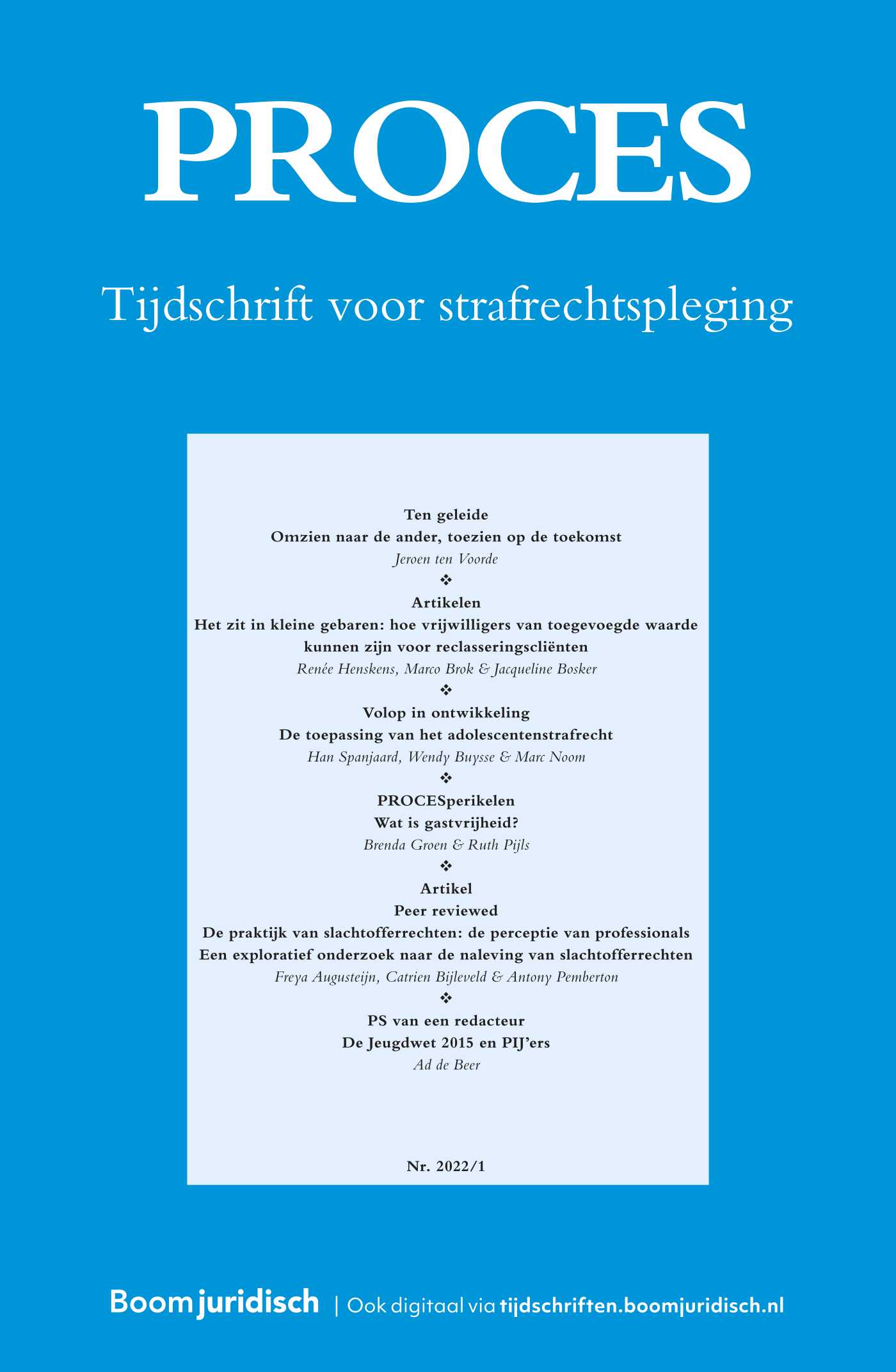|
Organisations and professionals address intimate partner violence in a complex system. This article explores how paradoxical situations in dealing with intimate partner violence in the system arise and how they can be prevented, using the Action Scales Model by Nobles and colleagues. During the Victimology Summer School in September 2022, solutions to prevent these paradoxical situations were discussed with multidisciplinary teams of professionals. Three solutions were proposed: (1) Putting the victim central, (2) Appointing a victim representative, and (3) Putting the term self-reliance up for discussion. The results can lead to important steps in preventing paradoxical situations, where victims receive appropriate help and are not at risk of secondary and repeat victimization. |


PROCES
Meer op het gebied van Criminologie en veiligheid
Over dit tijdschriftMeld u zich hier aan voor de attendering op dit tijdschrift zodat u direct een mail ontvangt als er een nieuw digitaal nummer is verschenen en u de artikelen online kunt lezen.
| Ten geleide |
Strafrecht in tijden van demonstraties |
| Auteurs | Jeroen ten Voorde |
| Auteursinformatie |
| Peer reviewed |
|
| Trefwoorden | partnergeweld, herhaald slachtofferschap, secundaire victimisatie, multidisciplinariteit |
| Auteurs | Arne Mellaard, Pauline Aarten, Janne van Doorn e.a. |
| SamenvattingAuteursinformatie |
| Artikel |
Emotiewerk in de reclasseringspraktijk‘Er gebeurt van binnen van alles, maar dat probeer ik niet te laten zien’ |
| Trefwoorden | reclasseringswerk, emotionele uitingen, emotional labour |
| Auteurs | Marie-José Geenen en Karlijn Duin |
| SamenvattingAuteursinformatie |
|
In the performance of their work, probation officers are confronted with the emotions of clients and with their own emotions. We asked fifteen probation officers which emotions they encounter in their work, how they express emotions in the interaction with their clients and what they need to maintain their resilience despite the emotional burden of their work. The emotions they experience range from caring, pride, passion to indignation, irritation and disgust. Probation officers realize that expressing emotions is not always desirable in the light of building a working alliance and working on recidivism reduction and reintegration. By means of surface acting and deep acting (Hochschild, 1983) they find their way in sometimes hiding and sometimes feigning emotions. Probation officers indicate that they need space to let off steam and on the other hand the opportunity to reflect with colleagues about what can and cannot be expressed in contact with their clients. |
| PROCESperikelen |
Burgerparticipatie in de strijd tegen ondermijning, met communicatie op maat als aanjager |
| Trefwoorden | ondermijning, burgerparticipatie, interventie, maatwerk |
| Auteurs | Imke Smulders |
| Auteursinformatie |
| Artikel |
Femicide en femicidebeleidEen terreinverkenning |
| Trefwoorden | femicide, vrouwenmoord, gendersensitief beleid, gendergerelateerd geweld |
| Auteurs | Anouk Alberts en Martina Althoff |
| SamenvattingAuteursinformatie |
|
In this article, the authors examine the extent to which the Netherlands has a ‘femicide problem’ that requires specific policies. Based on an analysis of definitions of femicide, the phenomenon appears to lack a clear description. This lack of clarity affects the data on femicide, which consequently seem to involve different types of violence and are misinterpreted by Dutch media. The authors note that the Netherlands already has policies on these different forms of gender violence, making specific policies on femicide seem unnecessary. Although femicide is a serious problem, the authors conclude that specific policies do not currently seem to contribute to making femicide more visible and less urgent. |
| PS van een redacteur |
‘Black box’ in de executiefase |
| Auteurs | Coosje Peterse |
| Auteursinformatie |

